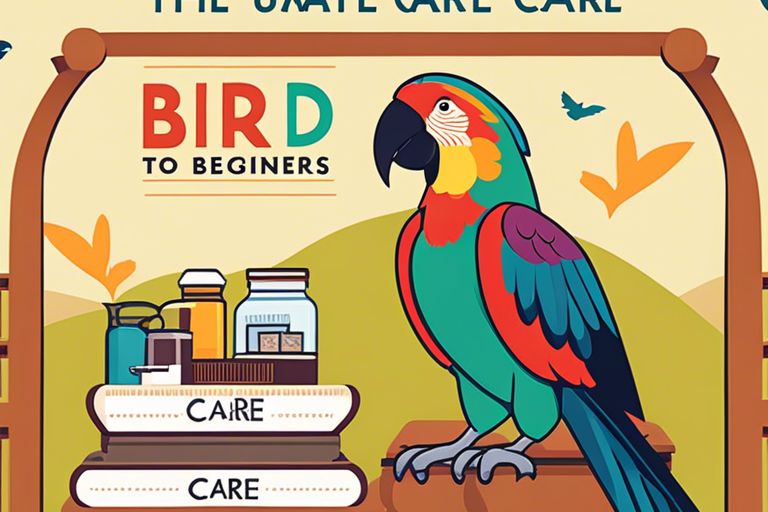You’ve decided to welcome a feathered friend into your home, choosing to care for a bird is a rewarding experience. However, it’s important to understand that birds require special attention and care to thrive in a domestic setting. This ultimate guide is designed specifically for beginners looking to provide the best possible care for their avian companions. From selecting the right bird species and setting up a suitable habitat to ensuring proper nutrition and healthcare, we’ll cover all the basics you need to know to keep your feathered friend happy and healthy.
Setting Up a Comfortable Home
Some Best Pet Birds for Beginners: The Ultimate Bird Owners Guide recommend creating a comfortable home for your new feathered friend. This is necessary for their well-being and happiness.
Choosing the Right Cage
To ensure your pet bird feels safe and secure, it’s vital to choose the right cage. Consider the size of the bird and how much room they need to fly and move around comfortably. Opt for a cage with bars that are appropriately spaced to prevent any escapes.
Essentials for a Healthy Habitat
The key to a healthy habitat for your pet bird is providing them with the necessarys they need to thrive. This includes fresh water, a nutritious diet, and a clean environment. Make sure to regularly clean the cage and provide your bird with plenty of toys and perches for mental and physical stimulation.
It is crucial to keep the cage away from drafts, direct sunlight, and any potential hazards like toxic plants or household chemicals. Regular vet check-ups are also important to ensure your bird stays healthy and happy.
Nutritional Needs and Feeding
The Bird Care 101: Your Basic Bird Primer – VIP Pet Services guide is imperative for any bird owner. One of the most critical aspects of bird care is understanding their nutritional needs and feeding habits.
What to Feed Your Bird
Feeding your bird a proper diet is crucial for their health and well-being. Different bird species have varied dietary requirements, so it’s imperative to research what specific foods are best for your feathered friend. In general, a balanced diet for birds includes a mix of seeds, pellets, fruits, vegetables, and proteins.
Tips for a Balanced Diet
One of the keys to providing a balanced diet for your bird is variety. Offering a diverse range of foods ensures that your bird receives all the necessary nutrients for optimal health. Consider incorporating fresh foods, such as leafy greens, carrots, berries, and cooked eggs into their diet. Rotating different types of food will keep your bird interested and provide a more complete nutrition profile. The quality of the food you offer is just as important as the variety. Make sure to provide fresh, high-quality food to meet your bird’s needs.
Health and Wellness
Recognizing Common Health Issues
One of the most important aspects of bird care is being able to recognize common health issues that your feathered friend may experience. It’s crucial to keep an eye out for signs of illness such as changes in behavior, eating habits, or appearance. If you’re unsure about what to look for, How to Care for a Bird (with Pictures) can be a helpful resource.
Preventative Care and Regular Check-ups
On top of being vigilant about your bird’s health, preventative care and regular check-ups are key to ensuring they stay happy and healthy. Scheduling annual wellness exams with an avian veterinarian can help catch any potential issues early on. Implementing proper nutrition, clean living conditions, and providing mental stimulation are also imperative for their overall well-being.
Another important aspect of preventative care is establishing a good relationship with an avian veterinarian who is knowledgeable about bird health. They can provide guidance on vaccinations, parasite control, and appropriate grooming techniques to keep your bird in top condition.
Social Interaction and Training
Taming and Bonding with Your Bird
Many new bird owners may find it daunting to build a strong bond with their feathery friend, but with patience and consistency, it is entirely achievable. An imperative first step is to spend time near your bird’s cage, talking to them softly and offering treats to establish trust. Slowly, you can start exposing your bird to your hand by placing it in the cage with treats, allowing them to approach you at their own pace. Recall, establishing a bond takes time, so be patient and consistent in your efforts.
Teaching Tricks and Encouraging Play
Encouraging play and teaching tricks to your bird can be a fun way to bond with them and keep them mentally stimulated. Teaching your bird simple tricks like stepping up on your hand or playing with toys can help build trust and strengthen your relationship. Regular playtime outside the cage can also provide much-needed exercise. For instance, you can use puzzle toys or create obstacle courses for your bird to navigate through, keeping them engaged and entertained.
Conclusion
The Ultimate Guide To Bird Care For Beginners covers everything you need to know about providing excellent care for your feathered friend. By following the tips and guidelines in this guide, you can ensure that your bird stays healthy, happy, and well-cared for. Be mindful of, with the right knowledge and dedication, you can create a loving and enriching environment for your bird to thrive in. Happy bird-keeping!














